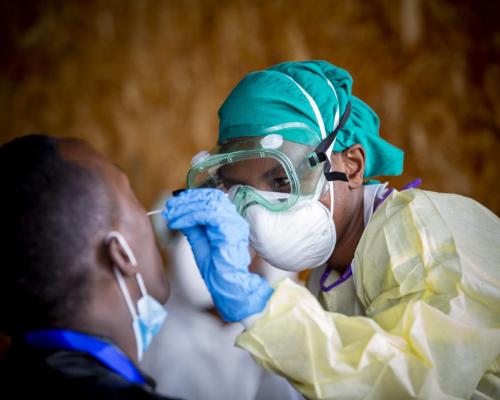The Indian Council of Medical Research (ICMR) has issued fresh guidelines for Covid-19 testing as the laboratories face challenges to meet the expected testing target due to the rise in caseload.
The ICMR directed that “RT-PCR test must not be repeated in any individual who has tested positive once either by RAT or RT-PCR”.
Moreover, recovered individuals who get discharged from hospitals will not require another round of testing, the ICMR said.
ICMR has recommended no RT-PCR tests if:
An individual has tested positive by rapid antigen test.
An individual has tested positive once by RT-PCR test.
One has completed 10 days home isolation period with no fever for the last three days.
At the time of hospital discharge.
A healthy individual is undertaking interstate domestic travel. While this is a requirement imposed by states, ICMR said this can completely be removed to reduce the load on laboratories.
What is RT-PCR Test?
The COVID-19 real-time reverse transcription-polymerase chain reaction (RT-PCR) tests the upper and lower respiratory specimens such as swabs, sputum, nasopharyngeal, and others of the patients suspected with COVID-19. Nasal or throat swabs of an individual are collected under the observation of a healthcare practitioner or a self-collection kit can also be used that is commercially approved for use of this test.
This test includes the extraction of ribonucleic acid (RNA) a genetic material of the COVID-19 virus. The test analyzes the genetic sequences such as the SARS-COV-2 virus and then the results are positive. The test results are negative when the sample analyzed does not contain the virus or the sample is not administered properly. RT-PCR test is expensive, as it requires trained professionals, RNA extraction machines, and a laboratory. A minimum of four hours is required to get the RT-PCR test results and gauge the extent of infection in an individual.
As of May 4, the overall nationwide test positivity rate has gone up above 20 percent in the past month and India currently has 2,506 molecular testing laboratories, including RT-PCR, TrueNat, CBNAAT, and other platforms.
The total daily national testing capacity is close to 15 lakh tests considering a three-shift operationalization of the existing laboratory network.
At present, the laboratories are facing challenges to meet the expected testing target due to extraordinary caseload and staff getting infected with COVID-19.
In view of this situation, it is imperative to optimize the RT-PCR testing, and simultaneously increase the access and availability of testing to all citizens of the country.
The ICMR suggested that States set up mobile testing systems. The advisory also said RAT should be upscaled to meet the demand and that States should decide on the payment modalities.
The advisory said all those showing symptoms of fever with or without cough, headache, sore throat, breathlessness, body ache, recent loss of taste or smell, fatigue and diarrhoea during the current wave of COVID-19 should be treated as suspected cases of COVID-19 unless proven otherwise.
Current COVID-19 situation in India:
As many as five states reported their highest daily fatalities on Tuesday, as India saw another 3,460 Covid deaths. The city of Bengaluru too has reported an alarming positivity rate of 55%. Meanwhile, most private vaccination centres could not operate to their full capacity due to shortage of vaccines.
